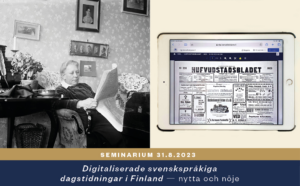CALL FOR PANELS IS OPEN – VOICES AND PRACTICES IN RESEARCH
XII Ethnology Days in Helsinki, 14–15 March 2024
Abstract
Giving voice to research participants has been a central, albeit criticized, principle in ethnological research. Making different experiences visible and bringing them into dialogue with one another is an important goal for ethnologists. ‘Small’ topics and everyday perspectives are familiar to other fields in cultural studies as well. Highlighting everyday life and the practices of everyday life is the basis for the social impact of cultural studies.
Researchers, research participants, those who apply research methods and results, and other interested parties all possess unique voices. The meanings of our research change and can be re-evaluated in different contexts and over long periods of time. For us researchers, it is important to understand the ways in which we influence the world through our studies. Where and how are the voices of our research heard? Whose voices are heard, and who listens to them? What kind of research is valuable? Can research be too ‘small’ to be heard and considered beyond academia? At Ethnology Days 2024, we will reflect on the voices of ethnological research – strong and muted, empathetic and critical, constructive and challenging – both in the past and today.
We invite proposals for panels that consider different perspectives, discussions and temporalities related to the topic of research impact. The panels can cover, for example, the different ways and contexts of influencing others with our studies; research visibility in traditional or social media; and the construction and demolition of ideas, understandings and identities within research and heritage work.
In addition, we are interested in the voices within research and heritage processes. What kind of voices we hear, identify or interpret in fieldwork, research materials or heritage work? What methods can we use to make different voices heard? Are some voices ignored, and what do the silences tell us? Make your voice heard, and send your panel proposal (max. 350 words abstract) by 15.9.2023 to Seminar Secretary Salli Ritola, email: seminarsecretary(a)ethnosry.org
Speakers
Fataneh Farahani is a professor of ethnology in the Department of Ethnology, History of Religions and Gender Studies at StockholmUniversity. The distinctive contributions of her work include applying gender and sexuality to the field of migration studies, integrating race and translocational understandings in the field of masculinities studies, analysing the field of epistemology and knowledge production through the lens of race and gender, and integrating critical race and whiteness studies in the study of hospitality and hostility within the field of migration.
Sharon Macdonald is the Alexander von Humboldt professor of social anthropology at the Humboldt-Universität zu Berlin, where she directs the Hermann von Helmholtz Centre for Cultural Techniques. She has worked on the practices and politics of memory, heritage and identity, especially in Europe. Her recent research has included examinations of how much we can keep collecting from the past, of how diversity and difference are – and could be – dealt with in museums, and of the potential of artistic approaches in ethnographic work on heritage.
Tytti Steel is an ethnologist and docent (associate professor) at theUniversity of Helsinki. In her research, she has focused on variousaspects of working life. She has a special interest in gender research, intersectionality and action research. Currently, she is working on two projects: (1) the post-pandemic work situations of healthcare workers with minority backgrounds and (2) gig work and the platform economy within the cultural sector.
